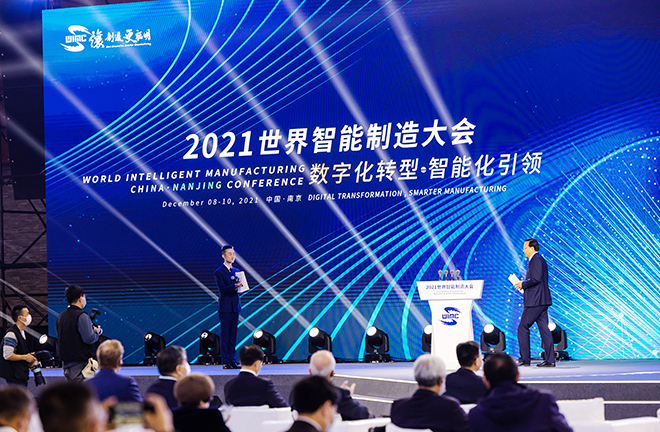Yangtze River Delta embraces manufacturing upgrades

The opening ceremony of the 2021 World Intelligent Manufacturing Conference in Nanjing, Jiangsu Province, Dec. 8 Photo: CFP
NANJING—A sub-forum on the integration and intelligent development of the manufacturing industry in the Yangtze River Delta during the 2021 World Intelligent Manufacturing Conference was held in Nanjing, Jiangsu Province, on Dec. 9. Scholars exchanged views on integration between the manufacturing industry and scientific and technological innovation in the Yangtze River Delta.
Integration and innovation
Accelerating the high-quality development of the manufacturing industry and transforming it towards digitalization and intelligentization is an important pathway and main direction for China to transition from a manufacturing hub to a manufacturing powerhouse, said Lu Yanqing, vice president of Nanjing University. China possesses good “manufacturing genes,” while the Yangtze River Delta region boasts the leading economic level and industrial foundation in the country, which gives the most fertile economic soil for study of “intelligent manufacturing.”
“Integration” and “high quality” inspire forward-looking, professional, and quality manufacturing development ideas, said Wang Jingjing, director of the technological cooperation office at Department Three at the Chinese Academy of Engineering (CAE). As 2021 marks the third year since the integrated development of the Yangtze River Delta region has been upgraded to a national strategy, we need to better manage and refine high-end research results and decision-making suggestions to provide intellectual support for governmental scientific decision-making and industrial innovation-driven development.
Yuan Liang, an academician of CAE and president of Anhui University of Science and Technology, noted that Anhui Province has introduced and cultivated a large batch of local high-tech enterprises and leading enterprises in the process of joining the Yangtze River Delta integration. Some of them have stepped into the forefront of the country and even the world.
According to Liu Zhibiao, director of the Yangtze IDEI at Nanjing University, economic integration within the delta helps achieve economies of scale, attract resources from both inside and outside, lower manufacturing and trading costs, and form the home-field globalization effect. It is instrumental to building a world-class advanced manufacturing industry cluster, developing an innovative economy, optimizing industrial structures, and shaping a new development paradigm. Liu suggested breaking the administrative regions’ economic pattern, calling upon local governments to change from excessive competition to rational cooperation, and to leverage a unified anti-monopoly law or competition law.
Hu Yidong, secretary of the Party Committee of Jiangsu Industrial Technology Research Institute, mentioned the industrial interaction between Jiangsu Province and Shanghai, which demonstrates the solid foundation of the Yangtze River Delta integration. The sound momentum of delta integration can be found from rural economic development to the forging of a “world factory,” as well as an industrial innovation highland that is currently under construction.
One of the key tasks for the next step is to explore and practice from the innovative perspective, Hu added. From a technological level, there is the worldwide challenge of converting science to technology. Between the source of technological innovation and industrialization, there exists a series of links and bottlenecks to break through. Beyond this, a feasible direction for pursuing the innovation path from the system and mechanism perspective lies in the platform integration between different regions of the Yangtze River Delta. Doing so can smooth the interflow of personnel, resources, and information, and effectively build an industrial technology innovation system with the joint efforts of enterprises, universities, and research institutes, creating an innovation ecology favorable for the development of industrial technology.
The “Report on the Industrial Innovation and Development in the Yangtze River Delta: Distribution and Synergy” was released at the conference. According to the report, industrial innovation in the region has shown a trend toward vigorous development in recent years. In particular, the producer service sector has gradually grown into an important force, augmenting its role in promoting innovation and upgrading in the manufacturing industry and optimizing industrial structures.
Frontier fields
As an important secondary clean energy, hydrogen is considered one of the important solutions toward the goal of “peaking carbon dioxide emissions and achieving carbon neutrality.” Chen Xuedong, an academician of CAE and deputy general manager of China National Machinery Industry Corporation (Sinomach), said that the technological innovation and industrial development of hydrogen energy in the delta should strengthen top-level design, avoid low-end homogenization of development, facilitate basic research on hydrogen safety application, and promote R&D and innovation of major equipment and key basic components.
As the core technology of the biotech industry, biotech manufacturing enjoys the edge of environmental friendliness, high production efficiency, and green processes, said Zheng Yuguo, an academician of CAE and dean of the College of Biotechnology and Bioengineering at Zhejiang University of Technology. China’s biotech manufacturing is deeply integrated with multiple disciplines, reaching applications in medicine, food, agriculture, energy, materials, chemical engineering, and environmental protection. Benefiting from the development of artificial intelligence, the internet, and intelligent automation equipment, the biomanufacturing industry is experiencing leapfrog advancement. With efforts trying to build intelligent cell factories and truly realize “intelligent biomanufacturing,” large-scale intelligent biomanufacturing is expected to achieve the high-quality sustainable development of industrialization.
Edited by YANG LANLAN
